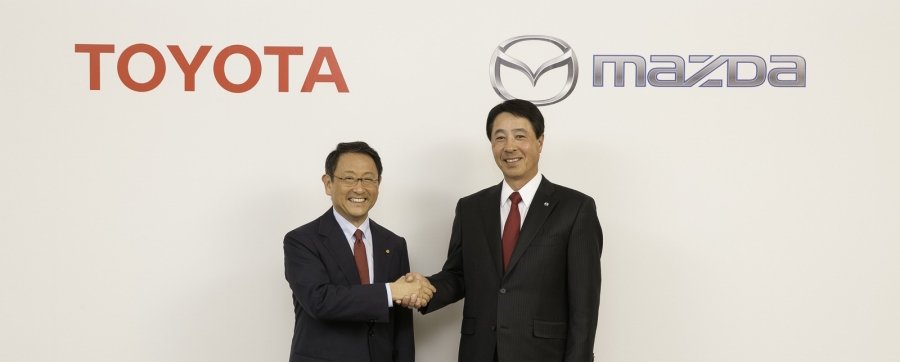Toyota, Mazda partner to build EVs at new $1.6 billion U.S. plant

The two will take small stakes in each other as part of the tie-up: Toyota, the world's second-largest automaker by vehicle sales last year, will take a 5 percent share of Mazda, extending its dominance in Japan's auto sector. Mazda will take a 0.25 percent share of its larger rival.
The plant, something of a surprise at a time of overcapacity in the U.S. market, will be a boost to U.S. President Donald Trump, who campaigned on promises to increase manufacturing and expand employment for American autoworkers.
The plant will be capable of producing 300,000 vehicles a year, with production divided between the two automakers, and employ about 4,000 people. It will start operating in 2021.
The electric vehicles cooperation, meanwhile, comes as the tightening of global emissions regulations prompts more automakers to develop battery powered cars, as the industry struggles with hefty research costs and intense competition from technology companies over technology like self-driving cars.
As part of the agreement, Toyota and Mazda will also work together to develop in-car information technologies and automated driving functions.
Toyota, Japan's biggest auto company, has been forging alliances with smaller Japanese rivals for several years, effectively engineering a loose consolidation of the Japanese auto sector. It already owns a 16.5 percent stake in Subaru, Japan's No. 6 automaker, with which it also has a development partnership.
Toyota is also courting compact car maker Suzuki to cooperate on R&D and parts supply as Toyota seeks to tap its smaller rival's expertise in emerging Asian markets.
A stake in Mazda may also prevent future incursions by tech companies, one analyst said.
"For a technology company which lacks the expertise in making cars, Mazda could look like a very interesting acquisition. They're very good, they're not too expensive. Maybe Toyota realizes this," CLSA managing director Chris Richter said.
"By buying a 5 percent stake, Toyota takes Mazda off the table rather than having it sit out there like a free agent which could someday be used against them."
COROLLA PRODUCTION SHIFT
Mazda stands to gain from a deal that gives the small automaker a production foothold in the United States. At the moment, Mazda ships all vehicles sold in the country, its biggest market, from its plants in Japan and Mexico.
It also gets a boost in electric cars.
With an R&D budget of around 140 billion yen ($1.27 billion) this year, a fraction of Toyota's 1 trillion yen, Mazda has said that it lacks the funds to develop electric cars on its own, a view shared by Subaru and Suzuki.
"Mazda needs electrification technology. In the past they've pooh-poohed EVs, they've felt that they can make internal combustion engines more efficient, but the bottom line is that globally you need to have this technology," said Janet Lewis, head of Asia transportation research at Macquarie Securities.
Mazda, whose annual global vehicle sales are one-eighth that of Toyota, caters to a specific audience largely in North America with its design-conscious sedans and SUVs, and has been focusing on developing more fuel-efficient gasoline engines.
The automakers plan to produce Toyota Corollas and a new Mazda SUV crossover at the new plant.
Toyota initially had been planning to produce Corollas at its new $1 billion plant currently under construction in Mexico, but this will shift to the United States, and the automaker will instead produce its Tacoma truck model in Mexico.
Toyota has set a goal for all of its vehicles to be zero emission by 2050. Last year it established a division to develop full-sized EVs, shifting gears after long favoring EVs only for short-distance commuting given their limited driving range and lengthy charging time.
Related News


